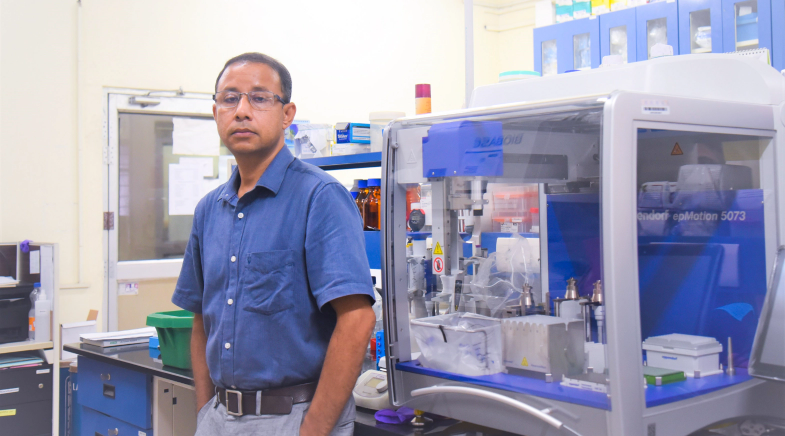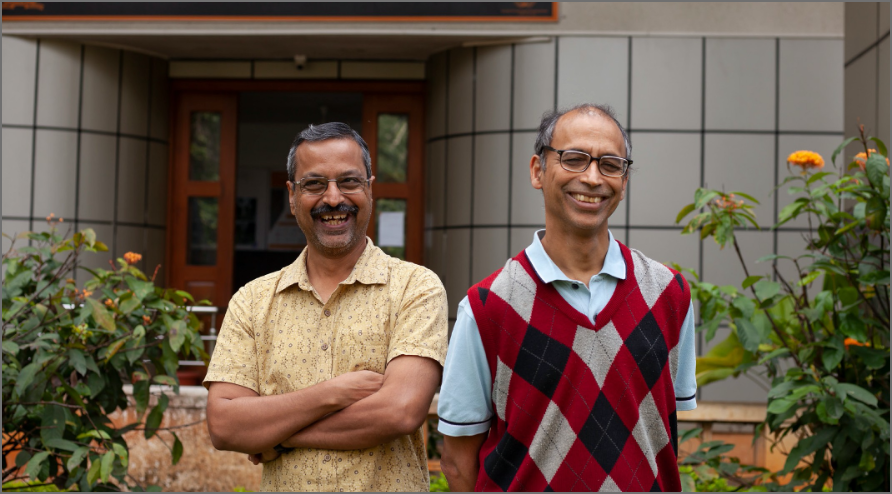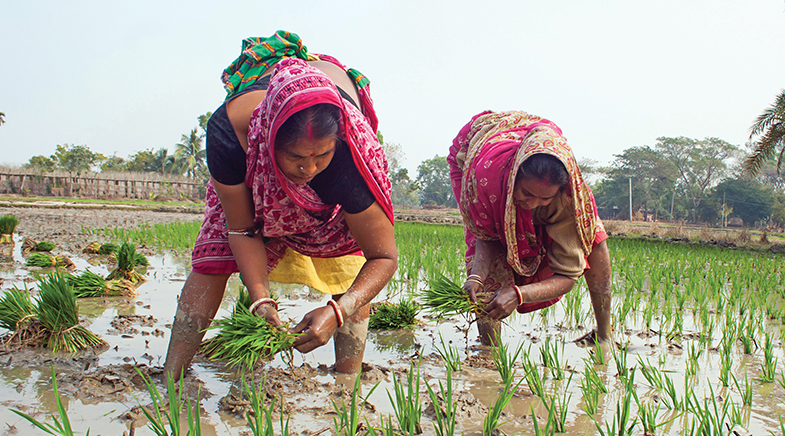What's your gut feeling?
-
- from Shaastra :: vol 01 edition 03 :: Sep - Oct 2021

As scientists turn the lens on gastrointestinal microbes, a handful of tests offers ways to assess one's gut and ward off disease.
The frequent flyer couldn't understand why she faced persistent gastric problems despite following a healthy diet. She thought the irritable bowel syndrome-like disorder plaguing her was related to her extensive travels abroad, but when it persisted, she got a gut microbiome test done.
It turned out she was eating too much broccoli.
The test showed an unusually high concentration of microbes that thrived on cruciferous vegetables such as broccoli in the gut. She was advised to eliminate these vegetables from her diet. She did so - and the symptoms subsided.
Like her, many are testing their gut microbes in search of a healthier life. The traveller, for one, underwent her microbiome profile test at Leucine Rich Bio (LRB), a Bengaluru-based start-up founded in 2014 by Kumar Sankaran, Debojyoti Dhar and Prabhath Manjappa, all three of whom have backgrounds in healthcare research and delivery.
LRB focuses on microbes, their genomes and the insights one can glean from poring over microbial genomes. Four years after it was set up, the company launched a test that the founders claim is the first of its kind in Asia. Called BugSpeaks, it can tell you the names of the many microbes housed in your gut and highlight imbalances, if any, in the gut microbiome.

If a particular type of microbe, for instance, is present in unusually high or low numbers, the test will tell you if it is linked to a certain disease, or can lead to one. Health experts at LRB will then suggest ways to fix the imbalance with diet recommendations and the inclusion of probiotics and prebiotics in your meals. The advice is "hyper-personalised", tailored to the person's specific needs, says LRB chief executive officer Sankaran.
Sankaran was the first to test his own gut microbes when BugSpeaks was launched, and others at LRB soon followed suit. His test results indicated he could develop rheumatoid arthritis. He modified his diet, which reduced the number of gut microbes that could increase his risk for rheumatoid arthritis.
By mid-2018, the test was available to the public. The process of testing is simple: a stool sample is collected and tested, the microbial composition in the sample is analysed via sequencing, and finally gut health is measured based on the diversity of microbes present in the sample.
The test results contain a gut health score that can range from -5 to +5. The more positive the score, the better is a person's gut health. The test results also provide a risk prediction for 16 diseases, including diabetes, hypertension, inflammatory bowels, rheumatoid arthritis and depression.
The gut microbiome test results provide a risk prediction for 16 diseases.
The BugSpeaks team has filed a patent for its gut health scoring system and for the process used in analysing microbial diversity. It claims to have information on 200,000 species of microbes in its database, which includes not just bacteria but also viruses and fungi. Sankaran describes the gut health measurement system as "technically robust", "trained on Indian populations", and reliant on a "huge microbiome dataset".
Gut microbiome is the sum total of the genomes of all the bacteria, viruses and fungi living in one's gut. The gut has trillions of tiny microbes; according to a 2016 estimate, an average human gut hosts some 3.8x1013 bacteria. Their number is roughly equal to the number of cells in a human body, and their total mass is about 0.2 kg.
Studies have also shown that the microbes together harbour several times more genes than the human genome and play an important role in maintaining a person's physical and mental health.
THE INDIAN GUT
Research on the gut microbiome of Indians has been growing in the last decade or so, with studies focusing on the type of microbes, how they affect people's health, and how different they are from those in the gut of people from other regions. For example, researchers from the Translational Health Science and Technology Institute (THSTI), Faridabad, and their colleagues found that the types of bacteria and fungus found in Indians vastly differed from those seen in people from Japan. The Indian gut showed an abundance of the bacterium Prevotella and fungus Candida; the gut of Japanese people was abundant in the Bacteroides bacteria and the Saccharomyces fungus.
Several other studies have reported the dominance of Prevotella in Indians. A 2016 meta-analysis by researchers from Pune and Delhi said the "distinctive feature" of the Indian gut microbiome was the abundance of "Prevotella and Megasphaera". The 2018 study Landscape Of Gut Microbiome - Pan-India Exploration found 993 unique micro-organisms across the Indian microbiome and the dominance of Prevotella followed by Faecalibacterium.

Diets clearly have an impact on the kind of microbes that thrive in one's gut. The dominance of Prevotella is most likely because Indian diets are rich in plant-based carbohydrates, points out Bhabatosh Das, Associate Professor, THSTI. Studies also found clusters of potentially pathogenic microbes in the gut of severely malnourished children in India.
Scientists are looking at how the information about the microbes may be used to probe gut health. Researchers at Life Sciences R&D, TCS Research, Tata Consultancy Services (TCS), recently came up with an in silico tool named GutFeel, which looks not at the composition of microbes in the gut but at their functions. The TCS scientists believe that different microbes can perform the same functions in different individuals. So, instead of looking for just differences in types of microbes, GutFeel focuses on the diversity in the functional potential of the microbes and uses that information to assess gut health.
Even though understanding of the Indian microbiome has improved in the last decade, there is a lot that is still not known, largely because of the diversity in diets and environment in India. Take, for example, people from Assam's Mishing tribe. The dominant gut microbe among them is the Succinivibrio bacteria.
"This is highly unusual," says Mojibur Khan, Associate Professor at the Institute of Advanced Study in Science and Technology (IASST), Guwahati, who has been studying gut microbes in different ethnic populations across the north-eastern region in India.
Globally, scientists recognise three different gut categories called enterotypes. Each category is dominated by a specific type of bacteria: Prevotella, Bacteroides, or Ruminococcus. But the Mishing tribespeople do not fall in any of the three categories. Khan says the most dominant microbe in their gut, constituting more than 30% of the total gut microbial population, is the Succinivibrio bacteria.
Some scientists think that microbiome research is still in its nascent stages in India and there is not enough data for the production of diagnostic tests.
"Though we have a long way to go before we can say that we understand the baseline gut microbiome of Indians, I am optimistic about the potential of microbiome research," Khan adds.
Khan is working on another area of microbiome research where he and his colleagues are trying to develop a microbiome-based diagnostic test for fatty liver disease. They have observed that the presence of two types of gut bacteria - Klebsiella and Enterococcus - indicates the initiation of liver disease and are using this information and other findings to develop a diagnostic kit for early detection of fatty liver disease. They have filed a patent for their diagnostic technology and once the patent comes through, they plan to bring out the diagnostic kit through GUTVicinta, a start-up incubated at IASST Social Venture & Entrepreneurship Consortium.

However, a key step before that would be to get an approval from the Indian Council of Medical Research or the Drugs Controller General of India, Khan points out. He stresses that all microbial diagnostic tests should be approved by a regulatory body and only be prescribed by a doctor who can also provide actionable solutions after looking at the test report.
Some scientists also think that microbiome research is still in its nascent stages in India and there is not enough data for the production of diagnostic tests. "It is not the right time to introduce such tests as data are not substantial (enough) to extrapolate it for commercial applications," says Rupjyoti Talukdar, Head, Pancreas Research Group and Division of Gut Microbiome Research, Asian Healthcare Foundation, Hyderabad. "Just taking a healthy, traditional and balanced diet could potentially maintain a good microbiome, even without testing," he adds.
Despite the reservations researchers might have, direct-to-consumer microbiome-based tests are becoming more accessible. In 2019, Bione, a Bengaluru-based start-up, began selling a direct-to-consumer microbiome test called MyMicroBiome. The test, as well as BugSpeaks, can be ordered online from their respective websites.
"Roughly 2,000 people have taken the BugSpeaks test," Sankaran says. He cites the case of the frequent traveller as among those who have benefited from it, and also gives the example of a person who was prone to depression. The microbiome profile showed an excess of fungal population - double the usual quantity, which is 10% of the total microbiome in an average Indian gut. The person was then put on a dietary correction programme, after which the episodes of depression reduced.
The tests are priced at around ₹10,000, but curiosity about what lies in the gut - along with easy access to such tests - is likely to ramp up the demand for microbiome profiling. It is, indeed, the inside story.
Have a
story idea?
Tell us.
Do you have a recent research paper or an idea for a science/technology-themed article that you'd like to tell us about?
GET IN TOUCH














